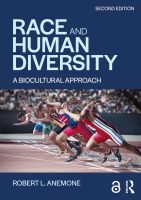Race and Human Diversity
Proposal review
Abstract
Race and Human Diversity is an introduction to the study of human diversity in both its biological and cultural dimensions. Robert L. Anemone examines the biological basis of human difference and how humans have biologically and culturally adapted to life in different environments. The book discusses the history of the race concept, evolutionary theory, human genetics, and the connections between racial classifications and racism. It invites students to question the existence of race as biology, but to recognize race as a social construction with significant implications for the lived experience of individuals and populations. This second edition has been thoroughly revised, with new material on human genetic diversity, developmental plasticity and epigenetics. There is additional coverage of the history of eugenics; race in US history, citizenship and migration; affirmative action; and white privilege and the burden of race. Fully accessible for undergraduate students with no prior knowledge of genetics or statistics, this is a key text for any student taking an introductory class on race or human diversity.
Keywords
1000 Genomes; 23 and Me; Biogeographic ancestry; Genotypes; HapMap; Lewontin; Mitochondrial Eve; Spencer Wells; Thermoregulation; biodiversity; biology; black lives matter; blacklivesmatter; charles darwin; developmental plasticity; diversity; dutch famine; epigenetics; evolution; evolutionary theory; gene introgression; genetics; health inequality; health outcomes; history of race; human adaptation; human diversity; human genetic diversity project; human genome; hunger winter; mendel; nutrition; paleo diet; police violence; race; skin color; skin colour; white privilegeDOI
10.4324/9781315179940ISBN
9781138894471, 9781138894495Publisher
Taylor & FrancisPublisher website
https://taylorandfrancis.com/Publication date and place
2019Imprint
RoutledgeClassification
Anthropology

